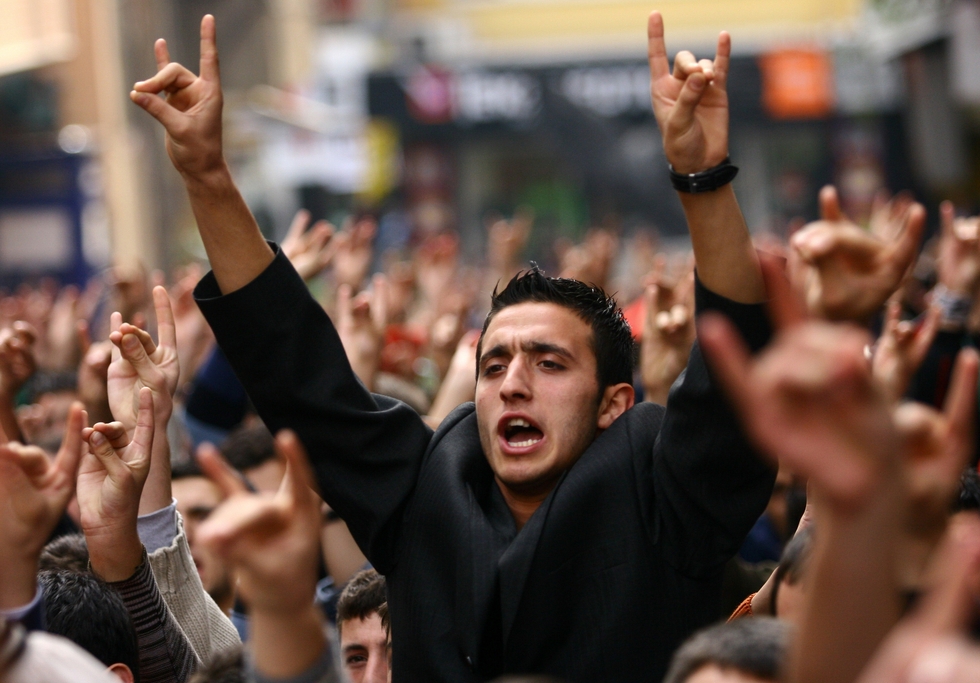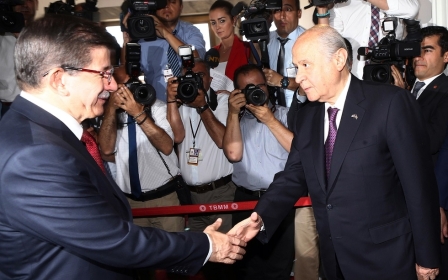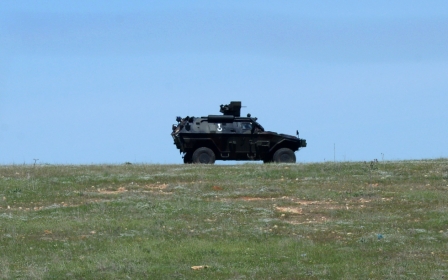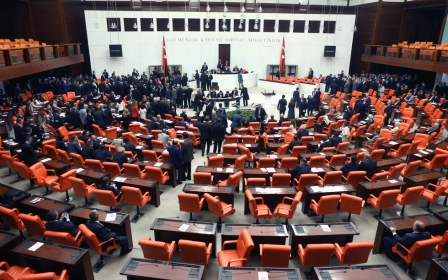ANALYSIS: The growing strength of Turkey's ultra-nationalists

On 21 June last year, Armenian jazz pianist Tigran Hamasyan put on a concert in the ruins of the mediaeval Armenian city of Ani in Turkey's Kars province. Hamasyan and an accompanying choir performed beneath the remains of the city walls of Ani, once the “city of 1001 churches,” and capital of the Armenian Bagratid Kingdom. Armenians and music lovers alike gathered in the sun to hear him, but the modest event drew the attention of more than the audience.
After the concert, the leader of the local branch of Turkish ultra-nationalist group popularly known as the Grey Wolves, issued a statement condemning the event and inciting violence against Armenians.
“I regretfully, fiercely and vehemently condemn the concert given by some neither-fish-nor-fowl human piece of garbage wearing priest's clothes,” Tolga Adiguzel said in the statement.
“Everybody should know their place and watch their step. Do they want to try our patience with the minds of traitors from inside and out? Should we go on the hunt for Armenians on the streets of Kars?”
Last week, Adiguzel was sentenced to seven months imprisonment for hate speech by the Kars Criminal Court after a case was brought against him by an Armenian member of parliament from the People's Democratic Party (HDP), Garo Paylan.
Adiguzel may face months in prison for these words, but his brand of crude ethnic prejudice is no fringe phenomenon in Turkey, where intolerance against Armenians, Kurdish, and Alevis is commonplace.
A visit to the imposing citadel museum in the centre of Gaziantep, for example, will entail reading of the many supposed Armenian “provocations” and “agitations” of the city's history. Visitors will learn how Armenians “traitorously joined the French army” and donned French uniforms during the French siege of the city in 1920. But there is no mention of the Armenian Genocide. The sole mention of a Kurdish population in the region comes in the context of French plots to create Armenian and Kurdish states.
The group to which Adiguzel belongs, the Grey Wolves, was founded in the 1960s by a former Turkish army colonel and went on to play a crucial part in street violence that gripped Turkey in the 1970s, carrying out hundreds of assassinations of left-wing activists. In 1978, in Maras, the group carried out a mass killing of 100 Alevis in what became known as the Maras massacre.
The Grey Wolves have chapters across Turkey and influence that stretches to connections with the Turkish National Intelligence Organisation (MIT) and the far-right Nationalist Movement Party (MHP).
The Nationalist Movement Party
The connections between the Grey Wolves, with its past massacres and members who speak openly of Turkey's ethnic minorities as “human garbage,” and the Nationalist Movement Party (MHP), one of the country's four main political parties - boasting dozens of members of parliament - are widely known if cloudy on the details.
The MHP grew directly out of 1970s Turkey, when far-right groups fought openly on the streets against Turkish communists - and the police - in riots that eventually led to the 1980 military coup. Some of the party's current grandees personally participated in street fights, and though the context and even ideology has changed, for the party's older generation the memory of that struggle is still fresh.
“From its founding, there have always been differences between the MHP as a formal party and the party youth wings like the Grey Wolves,” said Tanil Bora, author of a series of books about the far-right, and one of the leading scholars studying Turkish nationalism.
“The party has always represented more moderate and pragmatic strands of nationalism, whereas the youth base represents the naïve ideals of pure radicalism, and this is natural,” Bora told Middle East Eye. “But the dynamism of the youth base is also used by MHP as a threat: 'Do as we want or we won't be able to control our base.'”
The MHP is by no means the only Turkish political party that nationalists call home. On the contrary, nationalism is used in one form or another by all the main political parties.
The Republican People's Party (CHP) that was formed by modern Turkey's founder, Mustafa Kemal Ataturk, has an explicit nationalist history, and the ruling Justice and Development Party (AKP) frequently employs nationalist rhetoric and images of nation-state pride. It even has its own radical youth group, the Osmanli Ocaklari, styled after MHPs Grey Wolves.
“The AKP conceives of nationalism that includes an essential component of being Muslim,” Bora said, adding that in Turkish the root of the word of nationalism, “millet,” comes etymologically from “ummet,” or ummah, the community of Muslims. “In the AKP conception, Turk equals Muslim Turk, and in the ears of a Muslim, both sound the same.”
Even the left-wing HDP is in many regards an organised expression of Kurdish nationalism.
While some of the most violent or racist rhetoric employed by the Grey Wolves might sit uncomfortably with the MHP's more patrician politicians, ideologically the two groups share many commonalities.
In common with European nationalist parties, the MHP places much emphasis on Turkishness and an idealised Turkish identity. It has until recently rejected the fact that there is a Kurdish population in Turkey, and explicitly anti-Kurd sentiment is visible in the party leadership.
On 5 April, during the ongoing Turkish army campaign in the Kurdish city of Nusaybin, MHP leader Devlet Bahceli made a speech urging the government to “level Nusaybin to ground and leave no one alive”.
In contrast with contemporary European nationalists, who often esteem an ethnic identity bounded within their own borders, Turkey's nationalists today promulgate a pan-Turkishness that harkens back to an Ur-Turkic people emerging from Central Asia, whose ancestors are currently spread from Izmir, Turkey, to Xinjian, China. The party's support is highest in areas of the country with large Turkmen and Azeri populations.
The MHP is not exclusively a home for Turkey's far right. Within the party, there is a more tempered wing that follows a centre-right, pro-EU tradition. This wing, often younger than the party leadership, is less interested in ethnicity but instead defines Turkishness more broadly, and even inclusively, with a political nationalism that centres on belief in the prestige of the Turkish state.
“However, in times of conflict the voice of the radical base becomes much louder and the party itself becomes more radical,” Bora said, citing the current conflict in southeast Turkey as one such context.
“As a matter of fact, today the MHP speaks with the language of civil war: They speak of traitors, slaughterers, and they ask for a definite solution [war],” Bora told MEE. “Elements that see democratic rights, freedom of expression and the rule of law as luxuries are growing stronger.”
Shifting the centre
The question of the extent to which the MHP is nurturing Turkey's radical nationalists is one tied to the character of the party's leadership. The MHP has been led by one man, the suitably named Devlet (“state”) Bahceli, for almost 20 years, and under Bahceli the party has turned towards the conservative, the traditional and the religious.
These are popular political outlooks in Turkey. The MHP, however, has been sluggish in converting this into votes. At present, Bahceli is facing wholesale unrest within his party from members who feel his two decades of stewardship have born too little, and too sour, fruit.
Bahceli's long reign has given him time to acquire powerful friends, even in unlikely places. President Recep Tayyip Erdogan, of the governing AKP, and the nexus of newspapers and television channels that support him have recently emerged as supporters of Bahceli, defending the embattled leader against the disquiet in his own party.
“These are difficult times and Bahceli is seen as someone who can be controlled and is non-threatening to Erdogan,” said Burak Bilgehan Ozpek, professor of international relations at Ankara's TOBB University. “At this point, if he can, Erdogan will manoeuvre to protect Bahceli.”
After the general election in Turkey on 7 June last year, Erdogan himself began to shift to a more nationalist agenda, Ozpek said, adopting the catnip rhetoric of MHP supporters: nation-state pride, the exclusion of Kurdish identity, and the veneration of the police and armed forces. The positions of Erdogan and the MHP have therefore been converging, to the benefit of the AKP and the ultra-nationalists, and to the detriment of MHP's moderate wing.
This was noticed in Turkey's other political parties, which noted that Bahceli had been reluctant to challenge AKP policy. “The fake nationalist party has become more pro-AKP than the AKP itself since 7 June,” Selahattin Demirtas, co-leader of HDP, said.
A solid majority of Turkish society is nationalist and conservative by predisposition, so the fact that two of the major political parties appeal with nationalist rhetoric during times of political unrest is hardly surprising, but analysts of the far right like Tanil Bora say the rhetoric has also shifted the political centre.
Following the 7 June election the ultra-nationalists, including the Grey Wolves, returned to the streets, partly in protest against HDP's entrance to parliament. The MHP played down its involvement, claiming the mobs targeting HDP offices had no connection with them, and the exact identities of the rioters remain cloudy, however most analysts say MHP- and AKP-linked nationalist groups were involved.
The MHP lost half of its deputies when the results of the later snap election were announced last November, and criticism of Bahceli mounted. He was blamed for passing up a chance at a coalition government and seriously weakening the party's position in parliament. The only victor, the critics said, was Erdogan, and calls soon came for Bahceli to resign.
Trouble at the top
In the second half of June, MHP plans to hold a party congress in which Bahceli has said he will run as a leadership candidate against disgruntled party dissidents. However the party's last attempt at a congress in early May, which was opposed by Bahceli, was halted by Turkish police at the command of Erdogan.
Waiting in the wings, should the party succeed in ousting Bahceli, are four would-be MHP leaders of very different calibre who, if they prevail, will be of great significance.
Foremost among them is Meral Aksener, the consummate symbol of the centrist wing within the party. Aksener is from an MHP family, and is herself a former minister of interior for the defunct True Path party. However, she has emerged as an animated reformist candidate with significant backing from the party's younger MPs.
Opposing her are Umit Ozdag, a politician with military connections whose father was part of the 1960 junta that led Turkey after the country's first coup d'etat; Sinan Ogan, whom critics call an “opportunist” looking to gain amid the party's current weakness; and Koray Aydin, the candidate Turkey's ultra-nationalists would like to see at the head of a major political party. Aydin is a former parliamentary speaker but is also a veteran of the street with close connections to the Grey Wolves.
“The MHP is definitely in crisis,” says Selim Koru, a policy analyst at the Economic Policy Research Foundation of Turkey (TEPAV).
“Look at the party as it is now: It has by far the oldest average age among its MPs, because those MPs are from the ‘70s generation that clashed with police and communists - their credentials as rightists are rock solid.”
“Aksener is getting much more coverage than the others, she has the exposure and the greatest name recognition,” Koru told MEE. “And she represents this newer generation, even though she's an older politician, she's seen as a fresh face.”
Koru says that the MHP as it exists today might not necessarily be viewed as extremist, but a party led by Aksener would certainly not be. “If you look at the intellectuals behind the party, they belong to the nationalist movement ... but they feel that Turkish identity is more inclusive,” Koru told MEE.
Ominous potential
For now, support from Erdogan is keeping Bahceli's leadership alive in the face of a party revolt. However, should the party's members succeed in removing Bahceli, the person who replaces him could have great consequences for ultra-nationalism in Turkey.
A MHP led by Ozdag or Aydin could give Turkey's radical nationalists an even greater voice.
“The ideology of nationalism is deeply embedded into the foundations of Turkey,” Bora said. “In the country's national education system, its cliches, its culture, there is the constant presence of the ideology of nationalism.”
“It's enough just to look at the ubiquity of the Turkish flag and the childlike fascination with flags,” Bora told MEE.
“And the passage between ultra- or radical, nationalism and ordinary banal nationalism is a short one.”
The influence of radical nationalists on Turkish society is already great, as the numerous images of Turkish special forces spray-painting slogans promoting the “Power of the Turk” onto the ruins of Kurdish homes in the southeast show.
Should that influence grow, particularly within a polarising national political party, the consequences could be serious.
“We have to accept the potential here is ominous,” Bora said.
New MEE newsletter: Jerusalem Dispatch
Sign up to get the latest insights and analysis on Israel-Palestine, alongside Turkey Unpacked and other MEE newsletters
Middle East Eye delivers independent and unrivalled coverage and analysis of the Middle East, North Africa and beyond. To learn more about republishing this content and the associated fees, please fill out this form. More about MEE can be found here.




